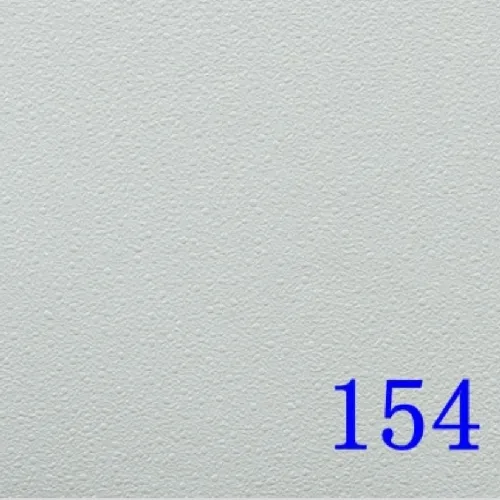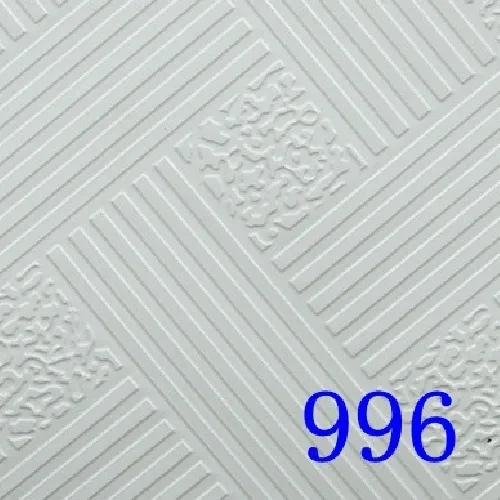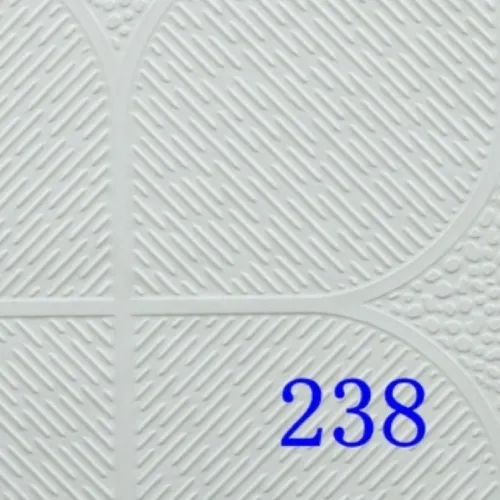8月 . 28, 2025 04:20 リストに戻る
PVC Gypsum Ceiling: Durable, Laminated Tiles for Modern Spaces
The Strategic Advantage of PVC Gypsum Ceiling Solutions in Modern Commercial and Industrial Design
In the rapidly evolving landscape of B2B infrastructure and interior design, material selection for ceiling systems plays a pivotal role in operational efficiency, aesthetic appeal, and long-term cost-effectiveness. Among the myriad options, the pvc gypsum ceiling stands out as a superior choice, offering a compelling blend of durability, hygiene, and design versatility. This article delves into the technical intricacies, market dynamics, and strategic benefits of incorporating PVC laminated gypsum ceiling solutions, providing a comprehensive resource for architects, contractors, and facility managers.
From its robust manufacturing process to its widespread application across diverse sectors, understanding the full potential of these advanced ceiling systems is crucial for making informed procurement decisions. We will explore key industry trends, detailed technical specifications, and practical application scenarios, supported by data and real-world insights, to underscore its value proposition.
Current Industry Trends and Market Drivers for PVC Gypsum Ceiling Solutions
The global market for ceiling tiles, particularly those integrating PVC and gypsum, is experiencing sustained growth, driven by several key factors. Urbanization and an increase in commercial and industrial construction projects globally are primary accelerators. There's a growing demand for materials that offer enhanced functionality beyond mere aesthetics, including improved acoustics, superior fire resistance, and moisture management. The increasing emphasis on indoor air quality and hygiene in public and private facilities has significantly boosted the adoption of easy-to-clean and anti-microbial surfaces, which is a core advantage of pvc gypsum ceiling tiles.
Sustainability is another critical trend. While PVC has faced scrutiny, advancements in manufacturing processes are leading to more environmentally responsible production methods, including recyclable content and reduced VOC emissions. Architects and designers are also seeking greater customization options, pushing manufacturers to offer a wider array of textures, colors, and patterns in pvc laminated gypsum ceiling tiles to meet specific project aesthetics without compromising performance. Furthermore, the rising awareness of energy efficiency in buildings promotes materials with good thermal insulation properties, where these ceilings can contribute to overall building performance.
| Driver Category | Impact Level | Key Indicators |
|---|---|---|
| Commercial Construction Growth | High | Increased office spaces, retail outlets, hospitality venues. |
| Demand for Functional Ceilings | High | Acoustic performance, fire rating, moisture resistance. |
| Hygiene and Indoor Air Quality (IAQ) | Medium-High | Easy-to-clean surfaces, anti-microbial treatments. |
| Aesthetic Customization | Medium | Diverse patterns, colors, textures for design flexibility. |
| Sustainability Initiatives | Medium | Recycled content, low VOC, energy efficiency contributions. |
Manufacturing Process of PVC Gypsum Ceiling Boards: A Technical Overview
The production of pvc laminated gypsum ceiling board involves a meticulously controlled, multi-stage process that ensures the creation of a high-performance, durable, and aesthetically pleasing product. Understanding this process is key to appreciating the inherent quality and reliability of the final ceiling solution.
Materials Composition:
- Gypsum Core: Comprising high-purity calcium sulfate dihydrate (CaSO4·2H2O), often enhanced with fiberglass rovings for increased strength and fire resistance, and various additives to control setting time, water absorption, and density.
- PVC Film: A durable polyvinyl chloride film applied to the face, providing a decorative finish, moisture resistance, and ease of cleaning. This film can be printed with various patterns and embossed for texture.
- Aluminum Foil/Backing Paper: Often applied to the back of the gypsum core for enhanced moisture barrier properties, thermal insulation, or sound absorption, depending on product specifications.
- Adhesives: Specialized, non-toxic adhesives formulated to create a strong, lasting bond between the PVC film and the gypsum core.
Process Flow:
- Gypsum Slurry Preparation: High-grade gypsum plaster is mixed with water, foaming agents, accelerators, and other additives to form a consistent slurry. This process is precisely controlled to achieve the desired density and strength.
- Casting and Forming: The gypsum slurry is continuously poured onto a moving belt, where it is spread evenly between layers of facing paper (or a release film, depending on the specific product design). The board is then shaped to the required thickness.
- Setting and Initial Drying: As the board moves along the line, the gypsum rapidly sets and gains initial strength. It then enters drying kilns where carefully controlled temperature and humidity remove excess moisture, achieving optimal hardness and stability. This typically reduces moisture content to less than 1%.
- Cutting and Edge Treatment: The continuous board is cut into standard dimensions (e.g., 600x600mm, 600x1200mm). Edges are often square-cut, though sometimes beveled or tapered depending on the intended suspension system.
- PVC Lamination: The dried gypsum board is transported to the lamination stage. A layer of specialized adhesive is applied to the face, followed by the precise application of the PVC film. This is done under controlled pressure and temperature to ensure a bubble-free, permanent bond. For products requiring enhanced thermal or moisture properties, an aluminum foil or special paper backing is laminated to the reverse side simultaneously.
- Curing and Quality Control: After lamination, the boards undergo a curing period to ensure the adhesive fully bonds. Throughout the entire process, rigorous quality control checks are performed, including dimensional accuracy, adhesion strength of the PVC film, moisture content, fire resistance, and surface finish integrity.
- Packaging: Finished pvc gypsum ceiling tiles are stacked, edge-protected, and shrink-wrapped or crated for transport, ensuring they arrive at the site in pristine condition.
This meticulous process ensures that each pvc gypsum ceiling board adheres to stringent international testing standards such as ISO 9001 for quality management and ASTM E84 for surface burning characteristics. Typical service life for these products can exceed 20 years under normal indoor conditions, offering exceptional longevity. Target industries include commercial offices, healthcare facilities, educational institutions, retail spaces, and even light industrial applications where hygiene and maintainability are paramount.

Technical Specifications and Performance Parameters
The performance of pvc gypsum ceiling tiles is defined by a range of technical specifications that are critical for architectural planning and engineering. These parameters dictate suitability for specific environments and compliance with building codes.
| Parameter | Standard Value/Range | Relevant Standard/Test Method |
|---|---|---|
| 厚さ | 7mm, 7.5mm, 8mm, 9mm, 9.5mm, 12mm | ASTM C1396 / ISO 7365 |
| Standard Dimensions | 595x595mm, 600x600mm, 603x603mm, 595x1195mm, 600x1200mm, 603x1212mm | Dimensional Tolerance Standards |
| Weight (9.5mm, 600x600mm) | Approx. 4.5 – 5.5 kg/sqm | Gravimetric Analysis |
| Fire Resistance Rating | Class A (Non-combustible core) | ASTM E84 / EN 13501-1 (Class B-s1, d0 for the composite) |
| Thermal Conductivity (k-value) | 0.16 – 0.18 W/m·K | ASTM C518 |
| Sound Absorption (NRC) | 0.10 – 0.20 (Standard), up to 0.50 (Perforated/Acoustic backed) | ASTM C423 |
| Light Reflectance | ≥ 80% | ASTM C1371 |
| Moisture Resistance | Excellent (PVC film acts as a barrier) | Humidity Sag Resistance Test |
| Surface Finish | PVC Laminated (various patterns/colors) | Visual Inspection, Adhesion Test |
These specifications underscore the versatility of pvc laminated gypsum ceiling board. For instance, the high light reflectance contributes to energy savings by maximizing natural and artificial light distribution. The low thermal conductivity aids in maintaining stable indoor temperatures, reducing HVAC load. Furthermore, the fire resistance rating is paramount for life safety and building code compliance, making it a reliable choice for public and commercial spaces.
Diverse Application Scenarios and Strategic Advantages
The inherent properties of pvc gypsum ceiling systems make them exceptionally well-suited for a wide array of application scenarios, addressing specific functional and aesthetic demands across various industries.
Commercial Offices and Corporate Spaces:
- Advantage: Professional aesthetics, easy integration of lighting and HVAC, sound absorption capabilities for improved productivity, and simple maintenance. The clean, crisp appearance contributes to a modern corporate image.
- Scenario: Meeting rooms, open-plan offices, reception areas.
Healthcare Facilities (Hospitals, Clinics, Laboratories):
- Advantage: Exceptional hygiene due to the washable PVC surface, resistance to moisture and fungal growth, non-shedding characteristics, and often anti-bacterial treatments. Crucial for maintaining sterile environments.
- Scenario: Patient rooms, operating theatres, waiting areas, laboratories, corridors.
Educational Institutions (Schools, Universities):
- Advantage: Durability to withstand active environments, good acoustics for effective learning, high light reflectance for bright classrooms, and fire safety compliance.
- Scenario: Classrooms, lecture halls, libraries, cafeterias, gymnasiums.
Retail Spaces and Shopping Malls:
- Advantage: Aesthetically pleasing finishes, ability to conceal services while maintaining accessibility, enhanced lighting integration to highlight merchandise, and ease of replacement for rebranding.
- Scenario: Storefronts, changing rooms, food courts, common areas.
Hospitality Sector (Hotels, Restaurants):
- Advantage: Premium appearance, sound attenuation for guest comfort, moisture resistance in bathrooms and kitchens, and low maintenance, contributing to operational cost savings.
- Scenario: Guest rooms, lobbies, banquet halls, kitchens, restrooms.

Technical Advantages and Cost-Effectiveness
Beyond specific applications, the overarching technical advantages of pvc laminated gypsum ceiling tiles translate directly into significant long-term value and operational benefits for businesses.
- Superior Moisture Resistance: The PVC lamination acts as an effective barrier against humidity and incidental splashes, making these panels ideal for high-moisture environments like restrooms, kitchens, and basements where traditional gypsum might deteriorate.
- Enhanced Fire Performance: Gypsum itself is non-combustible due to its chemically combined water content. When exposed to fire, this water is released as steam, significantly delaying heat transfer. The combined system often achieves Class A surface burning characteristics, contributing to building safety.
- Excellent Sound Attenuation: While standard boards offer moderate sound absorption, specialized versions with perforated PVC films and acoustic backing can significantly improve Noise Reduction Coefficients (NRC), creating more comfortable and productive indoor environments by mitigating echo and reducing noise transfer.
- Durability and Longevity: The robust gypsum core and protective PVC layer resist impact, warping, and sagging, ensuring a long service life even in demanding conditions. This reduces the frequency and cost of replacements.
- Hygienic and Easy Maintenance: The smooth, non-porous PVC surface prevents dust accumulation and is effortlessly cleaned with common disinfectants, crucial for environments requiring strict hygiene protocols, such as healthcare and food processing.
- Rapid and Clean Installation: As a modular system, pvc laminated gypsum ceiling board is installed quickly on standard T-grid suspension systems. This reduces labor costs and project timelines, minimizing disruption to business operations.
- Cost-Effectiveness: Considering the initial pvc laminated gypsum board price, its exceptional durability, low maintenance requirements, and contribution to energy efficiency (through light reflectance and thermal insulation), the total cost of ownership is highly competitive compared to other ceiling solutions over the product's lifespan.
Vendor Comparison and Customization Opportunities
When selecting a supplier for pvc gypsum ceiling solutions, B2B decision-makers must evaluate vendors beyond just price. Key criteria include product quality, certifications, manufacturing capabilities, and the ability to provide tailored solutions.
| Evaluation Criterion | High-Quality Vendor Characteristic | Risk of Substandard Vendor |
|---|---|---|
| Product Certifications | ISO 9001 (Quality), ASTM E84 (Fire), CE Mark, SGS reports. | Lack of verifiable certifications, only internal reports. |
| Material Quality (Gypsum Core) | High-density, low-moisture absorption, reinforced core. | Fragile, prone to sagging, inconsistent thickness. |
| PVC Film Durability & Adhesion | Tear-resistant, UV-stable, strong, bubble-free lamination. | Peeling, fading, bubbling, scratches easily. |
| Product Range & Customization | Diverse patterns, colors, sizes; ability for bespoke orders. | Limited options, rigid product lines. |
| Technical Support & Service | Pre-sales consultation, engineering support, after-sales service. | Poor communication, no post-purchase assistance. |
| Lead Time & Logistics | Consistent fulfillment, efficient global shipping. | Frequent delays, unreliable delivery. |
Customization Potential:
Leading manufacturers offer extensive customization options, allowing projects to achieve unique design visions without sacrificing performance. This includes:
- Pattern and Color Matching: Bespoke PVC film designs to align with specific branding or interior design schemes.
- Specialized Finishes: Options for high-gloss, matte, textured, or even metallic effects to create distinct atmospheres.
- Enhanced Performance Features: Integration of specialized backing (e.g., thicker aluminum foil for superior vapor barrier, acoustic fleece for higher NRC values, or anti-microbial coatings for medical environments).
- Non-Standard Dimensions: Production of panels in custom sizes to minimize waste and streamline installation in unique architectural spaces.

Application Case Studies: Proving Value in Practice
Real-world application demonstrates the tangible benefits of a high-quality pvc gypsum ceiling. These case studies highlight scenarios where specific challenges were met with tailored PVC laminated gypsum solutions.
Case Study 1: International Hospital Renovation Project
Client: A prominent international hospital chain undergoing a major facility upgrade in Southeast Asia.
Challenge: The hospital required a ceiling system that offered superior hygiene, moisture resistance for washrooms and surgical suites, excellent fire safety, and easy access to overhead services for maintenance. Aesthetic consistency across multiple wings was also critical.
Solution: Over 50,000 square meters of 9.5mm thick pvc laminated gypsum ceiling board with an anti-bacterial PVC film and a moisture-resistant backing were installed. The choice was based on the panels' Class A fire rating, ease of cleaning, and the supplier's ability to provide consistent color and pattern across large volumes. The demountable T-grid system allowed for quick access to electrical and plumbing systems without damaging the ceiling.
Outcome: The project was completed on schedule, meeting stringent health and safety regulations. The hospital reported significant improvements in facility hygiene, reduced maintenance time due to the washable surfaces, and enhanced patient and staff comfort due to improved acoustics and brighter environments.
Case Study 2: Multinational Tech Company Headquarters
Client: A leading global technology firm constructing its new headquarters in a major metropolitan area.
Challenge: The client sought a modern, minimalist aesthetic for their open-plan offices and meeting rooms, coupled with high acoustic performance to foster collaboration while minimizing noise distractions. Budget and project timeline were also key constraints.
Solution: A bespoke solution involving 8mm thick pvc gypsum ceiling tiles with a perforated PVC film and an integrated acoustic fleece backing was deployed. The panels were supplied in a custom matte white finish to match the architectural design. The supplier provided specific NRC data (0.45) tailored to the client's acoustic requirements.
Outcome: The installation achieved the desired contemporary aesthetic and significantly improved sound comfort across the office floors. Post-occupancy evaluations indicated a marked reduction in perceived noise levels, positively impacting employee satisfaction and productivity. The competitive pvc laminated gypsum board price combined with efficient installation kept the project within budget.

Trustworthiness: FAQ, Lead Time, Warranty, and Support
Establishing trust with B2B clients requires transparency in product information, logistical capabilities, and unwavering support. Here's what to expect from a reliable provider of pvc gypsum ceiling solutions.
Frequently Asked Questions (FAQ):
Q: What makes PVC gypsum ceiling tiles a hygienic choice?
A: The PVC film creates a smooth, non-porous surface that is resistant to microbial growth and can be easily wiped clean with standard disinfectants, preventing the buildup of dust, dirt, and pathogens. This is crucial for environments like hospitals and food processing units.
Q: Are these ceilings suitable for high-humidity areas?
A: Yes, the PVC lamination provides excellent moisture resistance, making pvc gypsum ceiling suitable for areas with higher humidity such as restrooms, kitchens, and basements. For extreme humidity, specific moisture-resistant gypsum cores with additional backing layers can be specified.
Q: How do PVC gypsum ceilings contribute to fire safety?
A: The gypsum core is inherently fire-resistant. When exposed to high temperatures, its chemically bound water is released, forming a protective steam barrier that delays fire spread. The overall assembly typically achieves Class A surface burning characteristics (ASTM E84) or comparable European ratings (EN 13501-1).
Q: What is the typical lead time for large orders?
A: Standard product lead times typically range from 15-25 business days from order confirmation, depending on volume and customization. For highly customized or exceptionally large orders, a project-specific timeline will be provided by our sales team. Expedited options may be available upon request.
Lead Time and Fulfillment Details:
- Production Capacity: Modern facilities are equipped to handle large-scale orders efficiently, ensuring consistent product availability.
- Global Logistics: Established networks for sea freight and air cargo ensure timely delivery to international destinations, with meticulous packaging to prevent transit damage.
- Order Tracking: Clients receive comprehensive updates on their order status, from manufacturing to dispatch and final delivery.
Warranty Commitments:
- Standard Warranty: A typical 5-10 year limited warranty against manufacturing defects, including delamination of the PVC film, yellowing, or structural integrity issues under normal use conditions.
- Performance Guarantee: Assurance that products will meet specified technical parameters (e.g., fire rating, light reflectance) as per product data sheets and certifications.
Customer Support Information:
- Dedicated Account Management: Each client is assigned a dedicated account manager for streamlined communication and personalized service.
- Technical Assistance: Expert engineers and product specialists are available for consultation on design, installation best practices, and troubleshooting.
- After-Sales Support: Prompt handling of inquiries, claims, and feedback to ensure long-term customer satisfaction.
Conclusion: The Enduring Value of PVC Gypsum Ceiling Systems
The selection of ceiling materials is a critical decision in B2B construction and renovation projects, impacting everything from initial cost and installation efficiency to long-term operational expenses and occupant well-being. The pvc gypsum ceiling, with its robust construction, versatile performance attributes, and aesthetic adaptability, represents a highly strategic choice for a diverse range of commercial and industrial applications.
By offering superior moisture and fire resistance, excellent hygiene, strong acoustic properties, and significant design flexibility, these systems not only meet but often exceed the stringent demands of modern building standards. Partnering with a reputable manufacturer ensures access to high-quality products, comprehensive technical support, and the capacity for tailored solutions that deliver enduring value and superior performance.
References
- ASTM International. (n.d.). ASTM C1396/C1396M - Standard Specification for Gypsum Board. Retrieved from https://www.astm.org/c1396_c1396m.html
- ISO. (n.d.). ISO 9001:2015 - Quality management systems — Requirements. Retrieved from https://www.iso.org/standard/62085.html
- European Committee for Standardization. (n.d.). EN 13501-1: Fire classification of construction products and building elements - Part 1: Classification using data from reaction to fire tests. Retrieved from https://www.cen.eu/news/press_release/2018/2018-09-17.html
- Gypsum Association. (n.d.). Fire Resistance Design Manual. Retrieved from https://www.gypsum.org/publications/fire-resistance-design-manual/
- US Environmental Protection Agency (EPA). (n.d.). Indoor Air Quality. Retrieved from https://www.epa.gov/indoor-air-quality-iaq







